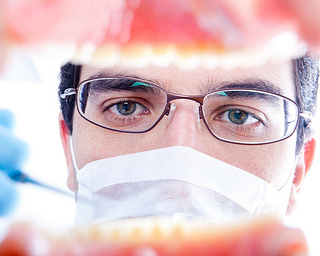June 8th, 2016

Do you have a space where a tooth used to be? Were you born with a missing tooth? Are you getting ready for dentures? You may be a good candidate for a dental implant. Metal dental implants were invented in 1965. Technology continues to advance with millions of implants placed in the United States and Canada. Placing implants has become mainstream and a common practice for offices like ours.
A dental implant is a small titanium post, which resembles a screw with threads. The post also has holes for bone to integrate. A dental implant is placed into the jawbone during a short dental procedure. It is relatively painless with very little post-operative pain. The threads on the implant post allow for the bone to fill in and integrate. To facilitate this process the implant is re-covered with gum tissue and allowed to heal and integrate for nearly three months. The implant acts as the root for the tooth to provide solid and stable support for the crown that’s yet to be placed.
The next step in the dental procedure is to uncover the implant and place a healing cap to allow the gum tissue to heal. After a short period of healing, an impression is taken to fabricate a crown to fully restore the missing tooth. The crown is then cemented on top of the post, at which point you can resume normal eating activities.
Dental implants do require some special care, but that is easily managed when you follow the directions outlined by Dr. Harrison Rubinstein, DDS. During your regularly scheduled cleaning, special instruments are used to clean implants. While a dental implant cannot get a cavity, a condition known as peri-implantitis can occur. This is very similar to periodontal disease as the end result is dental implant loss and loss of bone structure. Be sure to floss the dental implant daily and run the floss under the implant crown as far as it can go to remove food and plaque. If you use any picks or small brushes to go in between your teeth, make sure they are plastic. Metal will scratch the implant making it more susceptible to infection. Be sure to keep your regular dental visits and cleanings to monitor the implant and help preserve your investment.
June 1st, 2016

The community health awareness group Oral Health America has reported that 82 percent of adults are unaware of the role that infectious bacteria can play in tooth decay or cavities, and almost three out of five children aged 12 to 19 have tooth decay. Since June is National Smile Month, Dr. Harrison Rubinstein, DDS and our team at A Dental Art thought we’d remind our patients about the importance of good oral hygiene visits between office visits.
To keep your family’s smiles healthy and beautiful for years to come, be sure to:
- Brush at least twice a day with fluoride toothpaste
- Floss every day to clean between your teeth
- Eat a healthy, well-balanced diet
- Reduce your intake of sugary foods and drinks
- Visit Dr. Harrison Rubinstein, DDS for scheduled appointments
If you want to know more about healthy home care habits, feel free to ask our team at your next appointment, or ask us on Facebook!
May 25th, 2016

Memorial Day didn't become an official holiday until 1971, but Americans started gathering annually in the spring to remember those who lost their lives in war during the 1860s, right after the Civil War. Celebrated on the last Monday in May, people still decorate the grave sites of war veterans and hold memorial services, but Memorial Day has also evolved into a day that signifies the beginning of summer.
During the summer months, many people take road trips to visit family members. Some head off to the airport to enjoy a long-awaited vacation far away, while others look forward to spending time with friends and family at home. However you spend Memorial Day and the subsequent summer months, there are a few things you can take care of to ensure your summertime is enjoyable.
Checklist for an Enjoyable Summer
- Have the AC Checked. During the hottest days of summer, many families find themselves sweating it out due to a broken air conditioning system. Be proactive so you can avoid waiting for hours or days because the HVAC repair person is booked solid. Have your air conditioning system checked before or around Memorial Day each year.
- Ensure Security While You're Away. When you leave for vacation, the last thing you should have to worry about is the security of your home. Install a home security system, if possible, and put a timer on your lights so they go on and off at normal hours. You can also alert your local police department that you'll be gone, and ask them to drive by your house once in a while to make sure everything is okay.
- Visit Dr. Harrison Rubinstein, DDS Before Vacation. Many people put off exams until after summer vacation. Avoid the crowds and make sure your physical and oral health are in top shape prior to vacation time so there are no unpleasant surprises.
Our team at A Dental Art wants you to look forward to Memorial Day and the days of summer by preparing to spend the time safely and comfortably. As you plan ahead, take care of your health and secure your home, you can place your focus on creating memories with family members and friends while enjoying your favorite Memorial Day traditions.
May 18th, 2016

Dr. Harrison Rubinstein, DDS and our team at A Dental Art know this is an exciting time as you anticipate the arrival of your new little one. We want to take this opportunity to provide you with some important information pertaining to your oral health during pregnancy. Just as the rest of your body is changing, the amount of bacteria in your mouth also changes. Scientists don’t understand all the reasons why, but during pregnancy, your mouth is more susceptible to bacterial complications that could result in increased risk for gingivitis or periodontal disease. What researchers do know is the change in hormones creates a more favorable environment for gum infections and diseases when you are pregnant.
You may experience an increase in gingivitis, even while continuing with regular daily brushing and flossing, and routine semi-annual month cleanings. You will likely complain of increased bleeding of the gums with routine daily care and more tenderness in the mouth. This is due, in part, to the increased blood flow and volume that naturally occurs with pregnancy. There is a greater amount of blood flowing through your veins, which translates into slightly engorged gum tissues. If gingivitis prevails, you may also experience pain and tenderness. We can help you navigate through your specific needs.
Brushing your teeth two times a day may not be quite enough. Similarly, if you only floss on occasion, consider making this activity a daily habit. Mouthwash is also advised, or sometimes a mild saltwater rinse may feel better than a commercial brand. Consider other products with xylitol and a WaterPik for additional cleaning.
Finally, we now know that bacteria in the mouth circulate throughout the body. These harmful bacteria compromise your immune system and may increase your risk for respiratory illness and cause other strains on your immune system. Remember that nutrients as well as pathogens are shared with your baby. If you feel tired or tempted to slack on your home-care routine, remember the importance and implications of your daily decisions on how your care for your oral health.
Contact our convenient Howell, NJ location if you have more specific questions. We’re here to help you!





